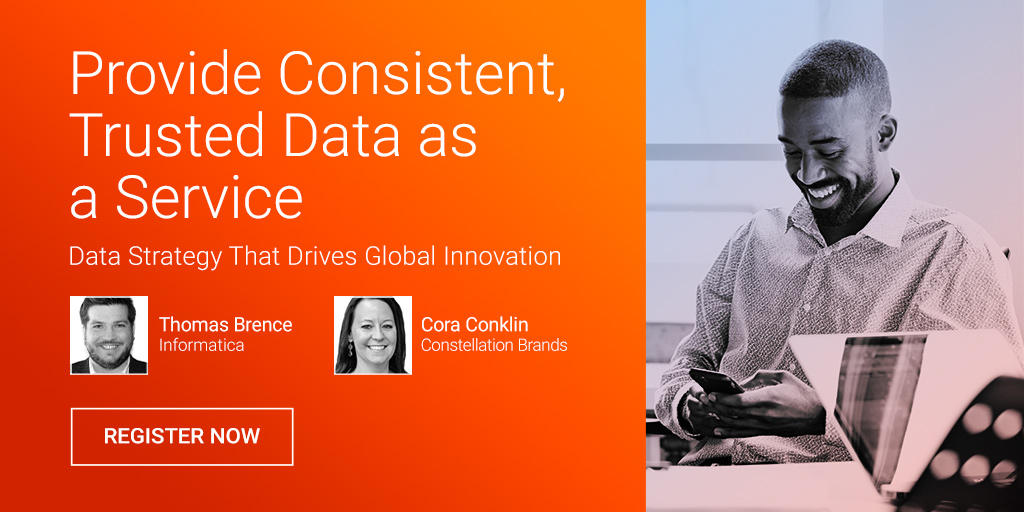Distilling the Best Data at Constellation Brands

As we enter the last quarter of 2021, I find it helpful to look back on the nearly two years we’ve been offering the Data Empowerment Experts Series. When we started out, I wanted to consistently feature data governance professionals who are empowering their organizations with trusted data. Some stories have focused more on ensuring that the organization has trusted data, while other stories have focused on the empowering, or enabling part of that narrative, by making sure their organizations can get their hands on the data. Although this month’s story touches on both parts, the real story here is how democratizing data and analytics ‘as a service’ is essential.
Cora Conklin, VP of Data and Analytics at Constellation Brands (manufacturers of Svedka vodka, Corona and Modelo beers, Kim Crawford wine, and more), is well aware of the role that data democratization plays at her organization. For the Data and Analytics team at Constellation Brands, making sure that trusted information can be found and delivered is critical to their operations. As a fan of their products, I’m personally happy to hear that consistency, accuracy, and trust are cornerstones of their mission. As we do with every one of the Data Empowerment Experts episodes, I sat down in advance with Cora to discuss her viewpoints.
Question: What’s your background and how did you get into the world of governance?
Answer: My background is in finance and accounting. I worked my way up through the accounting organization at Constellation and then, an interest in leadership and, more specifically, a desire to experience leading a larger team, led me to pursue an opportunity to lead a Finance shared services team. Unfortunately, that role didn’t work out, but that letdown, if you will, inspired me to apply for a role outside finance in data governance. I quickly found that attention to detail, process, accuracy, and consistency were key finance skill sets that readily apply to governance.
Question: Who are the best advocates for data at your organization?
Answer: The best advocates for data are those that have an inherent passion for data. I always say that our best advocates are “found” not “created.” Another key factor is relationships. My experience has taught me that relationships build equity that can be leveraged almost regardless of the topic. Said another way, my allies and supporters in finance continue to support me in data and analytics.
Question: How can you help to improve data literacy?
Answer: The first step to improving data literacy is introducing the concept of data as another “language,” that is, a means of communicating, understanding, and using data. I often pose key questions to assist this concept such as: What is the source of this data? Was the data transformed in any way? For what purpose do I seek to use the data?
Secondly, I think that data literacy is enhanced with continual education of an organization’s data domains, data processes, tools, and technology. This training cannot be a “one and done” effort; it must be revisited again and again. The space is changing so frequently, it’s the only way we can all keep pace and succeed.
Question: What parts of your business benefit most from having trusted data?
Answer: I’m passionate for data so I of course believe that all parts of the business benefit from trusted data—from external facing functions such as sales or marketing, to more internal functions such as human resources, finance, and IT. Also, as a Finance person by “trade,” I have to say that it is critical that finance has trusted data due to corporate reporting and regulatory disclosures required as a public company.
Question: How have you helped to build a data culture?
Answer: Building a data culture begins with the data & analytics team! We created a team mission and vision when we first established ourselves as the Data Management Organization (DMO). We got our name and purpose out into the organization however we could—company intranet site, attending functional staff meetings, and more! Now, that we have increased scope covering Analytics we reviewed and validated our mission and vision. I was pleasantly surprised to discover that we only had slight wording updates; at our core, our attributes and outcomes remained consistent.
Now we are on to the challenge of expanding that culture throughout the organization. To date, I’ve elevated the culture conversation to the EMC, as in order to advance our data literacy and decision intelligence capabilities, we have some meaningful change management work to do. We seek to learn from others as well on our journey, including consultants, industry peers, vendor relationships. I value the opportunity to hear how others have approached this challenge, what’s worked well and what hasn’t.
I hope that you’ll join Cora and I as we go through their journey in more detail on October 21st. Cora will share her journey from a line of business steward to data and analytics leader. She’ll outline their path to providing data and analytics as a service and insights that she’s learned along the way. We both hope you’ll join us for this fun and exciting event.









